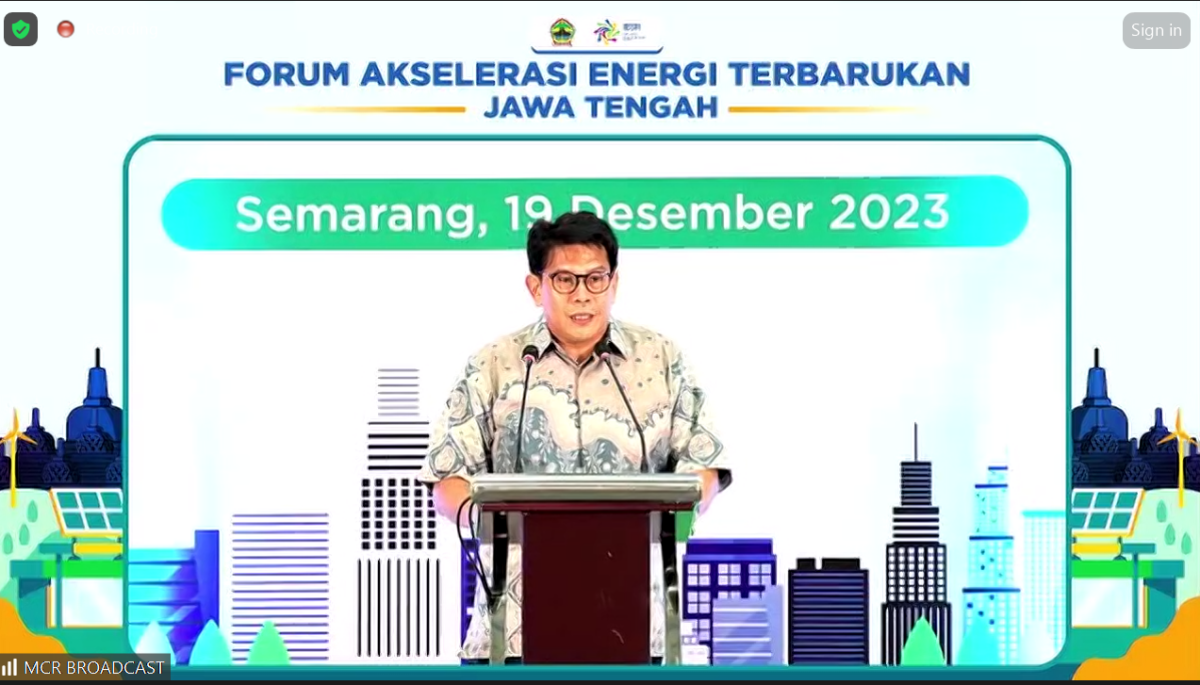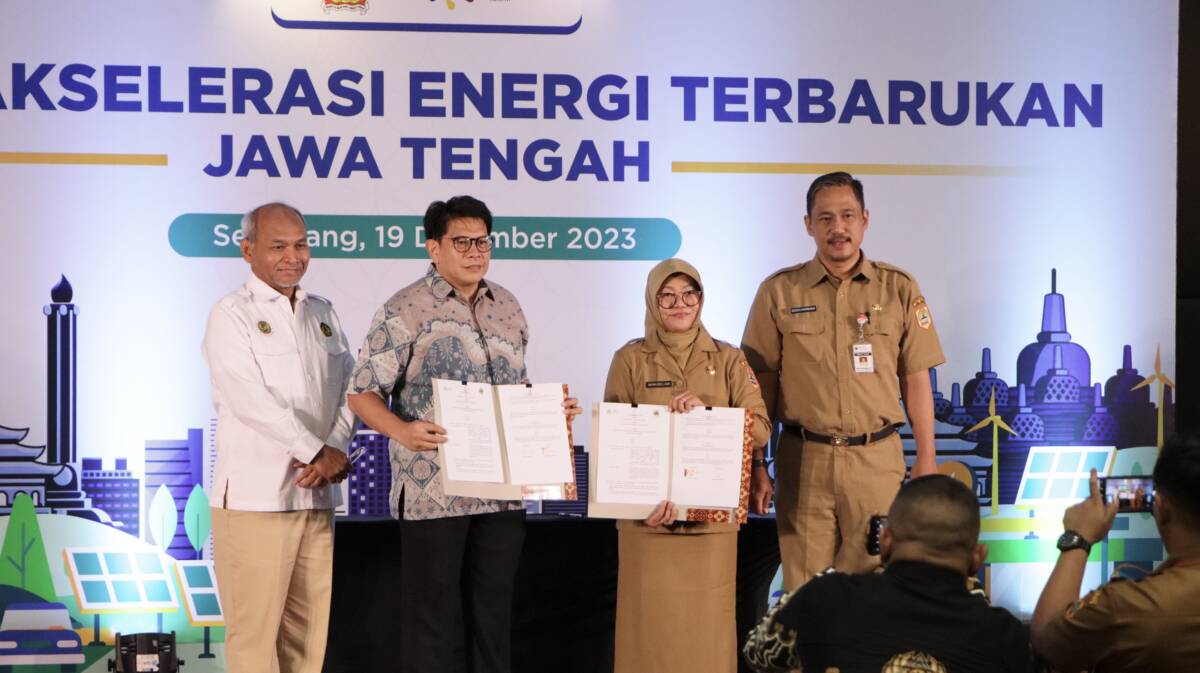
Semarang, December 19, 2023 – The Central Java Provincial Government is seeking to encourage collaboration and synergy to accelerate the energy transition and achieve the target of a 21.32% renewable energy mix in the region by 2025, as set in its Regional Energy General Plan (RUED). However, the renewable energy mix in the region only reached 15.76% in 2022, according to data from the Central Java Energy and Mineral Resources Agency (ESDM). With only two years left to achieve the target, the Central Java Provincial Government must pursue the remaining 5.56% of the renewable energy mix.
The Institute for Essential Services Reform (IESR) has been collaborating with Central Java since 2019 to speed up the implementation of renewable energy in the region. To accelerate the transition towards renewable energy and attain the RUED target, it is necessary to establish supportive conditions such as regulations, community initiatives, public-private partnerships, and foster investment. IESR believes that the regional funding capability must be enhanced to achieve the RUED target and attract more renewable energy investment.
“Central Java has a vast potential for renewable energy, including 194 GW of solar energy and 3.5 MW of wind energy. To accelerate the utilization of these resources, several measures need to be taken, such as disseminating information and building capacity related to renewable energy development, promoting investment ecosystems that prioritize green funding, and setting up monitoring, reporting, and evaluation platforms to encourage public participation,” said Fabby Tumiwa, Executive Director of IESR at the Central Java Renewable Energy Acceleration Forum (19/12).
During the same event, IESR announced a partnership with the Central Java Province Investment and One Stop Integrated Service (DPMPTSP) Office to promote green investment, especially in renewable energy in Central Java.

Sakina Rosellasari, the Head of Investment and One-Stop Integrated Service (DPMPTSP) in Central Java Province, has recently announced that her office has been actively promoting green investment in the region. To achieve this, they have taken several measures, such as compiling a list of investment-ready projects (known as Investment Project Ready to Offer or IPRO) that focus on circular economy projects such as waste treatment, mini-hydro, sustainable product processing, and waste processing into refused derived fuel (RDF). The DPMPTSP has also created promotional videos, met with various stakeholders, and signed cooperation agreements to encourage green investment in Central Java.
“The preparation of IPRO is important to attract potential investors and provide confidence that Central Java Province is the right location to invest. The IPRO in Central Java covers three sectors: infrastructure, agriculture, and tourism. Within the infrastructure sector is the construction of the Banjaran and Logawa mini hydro power plants in Banyumas Regency and the Tegal city B3 medical waste treatment and industrial development,” Sakina said.
The central government has issued Presidential Regulation No.11/2023 through the Ministry of Home Affairs. This regulation empowers local governments to manage and provide biomass, biogas, and new renewable energy. District and city governments have been granted the authority to support renewable energy development through Kepmendagri 900.1.15.5-1317 of 2023. Some examples of the district and city governments’ authority include waste management, provision of road equipment on district/city roads, empowerment of small fishermen in district/city areas, and provision of electrical/lighting installation components in office buildings.
Tavip Rubiyanto, an Associate Expert Policy Analyst for Energy and Mineral Resources Substance at the Directorate SUPD I of the Directorate General of Regional Development for the Ministry of Home Affairs, states that the development of renewable energy by regions is crucial to achieving the national renewable energy mix target of 23% by 2025.
Tavip explained that the rules regarding the discretion of regional authority in the management of new renewable energy will be effective from 2024. He hoped the regions would start budgeting to achieve these targets. Matters related to regional authority will be financed through the APBD.
To achieve the renewable energy targets at the regional level, Boedyo Dharmawan, Head of the Energy and Mineral Resources Office of Central Java Province, emphasized the need for cooperation between sectors. Coordination between the ESDM, environment, transportation, and planning agencies must be strengthened.
Boedyo Dharmawan also shared Central Java’s achievements in renewable energy, exceeding the annual target of 2022. These achievements include PLTS with a total capacity of around 25 MW, 6 MW micro hydropower plants (PLTMH), 31 MW mini hydro power plants (PLTM), and 322 MW hydropower plants (PLTA).
“Not only in terms of regulation, the government is also committed at the implementation level. To succeed in the energy transition towards the renewable energy era, the provincial government is also trying to control greenhouse gas emissions through the battery-based electric motor vehicle program,” said Boedyo.
Community initiatives that adopt renewable energy can significantly contribute to increasing the renewable energy mix in the region. This initiative can play an essential role in advancing the community’s welfare. Yanto, Head of Banyuroto Village, Sawangan District, Magelang Regency, and an Energy Independent Village, recognizes this fact.
Yanto explained that with a population of 930 cows and the assistance of various parties from the government, community, and non-governmental organizations, his village had developed around 34 biogas processing units from 2023 to 2027. This biogas helps to save the kitchen needs of 44 households in his village. Additionally, biogas can be used to fuel lighting lamps (petromak). The solid and liquid waste from cow dung is also helpful for organic fertilizer, which can fertilize agricultural soil.

